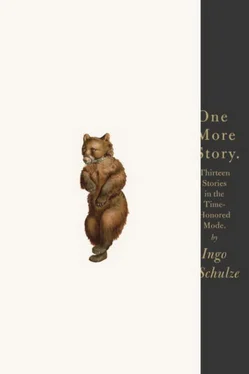The boss waved over an Indian woman. She had a larger comb and went right to work. A Japanese woman entered the shop and unpacked her bag in front of the mirror to our right. Her customer, whose Rastafarian locks were bound on top of his head like a sheaf of grain, wanted to have his head shaved up to ear level. I was enjoying the tickle at the back of my neck, the sense of being pampered, and lowered my head, turning it to the right, to the left — and saw my engineer from Bukhara enter. I made useless motions with my cape-covered hands and, I suppose, uttered some sort of sound. The Indian woman said, “Sorry,” and pressed her thumbs to my temples. The construction engineer stepped up behind us and showed off his trick of rapping his hand and sending a cigarette flying up to be caught in his lips. The boss greeted him, both whispered something to the Indian woman, who undid the bow of my cape and left her station.
Before I could get up, the engineer had thrown another cape over me and announced that he would now give me a haircut — free of charge, he immediately added. I said that unfortunately someone had just cut my hair, and rocked my head back and forth as if to prove it. But I would be glad to chat with him. “Just a trim,” he insisted. “It’s free,” and began tugging at my hair. All the while he had that same sad and serious look as the first time. I was careful about how I put my question. Why had he left Bukhara? He waved the question off. “That wasn’t a life anymore,” he said. And what had he hoped for from America? “America!” he said. Every question I put to him received only a curt answer. Finally I wanted to know why he had mentioned sudba. “Sudba?” He gazed at my reflection in the mirror. They had waited much too long — he only had to think about how far ahead they could have been by now. But next week his wife would be opening a beauty shop in Brighton Beach, and he had found a job as a mason and would show them what he could do. Even more important, his daughter had a good chance for a scholarship, and if she got it — he snapped his scissors triumphantly in the air and gave me a wink.
“Things are going great,” I said.
“Of course things are going great,” he replied, and snipped a big swatch of my hair. “If only we hadn’t waited so long!”
Then we fell silent. He snipped and snipped, and I thought about what I ought to write now.
“My, my, my!” went Mr. Neitherkorn as he entered the kitchen. “Were you attacked by wild animals?”
“They gave me two haircuts for the price of one,” I replied, giving my hair a tug.
“What do you mean?”
“I don’t know how to explain it,” I responded. “In any case it wasn’t fate, if that’s what you want to know.”
“Will you finally get over that!” he exclaimed. “Don’t you have eyes in your head? Haven’t you had enough yet?”
I sat down in my chair. He shoved a cup of coffee my way, rummaged in his shopping bag, and pulled out some carrot cake. As always he cut it in two by slicing through the plastic wrap, laid my half next to my cup, and returning to his shopping bag, took out the milk and opened it.
“Thanks,” I said. We drank coffee and ate carrot cake. I was afraid to go to my room and sit down in front of my computer. “I have no idea what I ought to write,” I said after a while.
“Don’t worry about it,” he said. His tongue was playing with his upper plate again. “I’ll tell you a story tomorrow. You can gussy it up a little.”
“What sort of story?” I asked.
“‘What sort of story?’” he repeated without looking up. “About a ‘Boy Who Left Home to Find Out About’ … and so forth.”
“Are you trying to play fate?” I asked.
“Oh no!” Mr. Neitherkorn cried, raising his arms with the palms turned heavenward, and held the position for a moment. “I’m just a barber,” he then remarked, lowering his hands again. “But there’s a lot to be learned there.…”
Writers and Transcendence
A few years ago, it was in February, I visited my mother in Dresden. We didn’t see each other that often but did talk a lot on the phone.
We were sitting over a light supper in the kitchen when the front doorbell rang. My mother fell silent. I set my cup down without making a sound. We didn’t even look at each other — whenever a disturbance threatens we play dead out of an instinctive reflex. We heard sobbing in the stairwell. “Christa dear,” a woman’s voice cried, “Christa dear.” Then only more sobs.
“My Pushkin!” our neighbor Henrietta cried as she entered the kitchen. She embraced me — her eye shadow was smeared, tears had left black tracks on her cheeks.
Ever since Henrietta found a photograph of me in a local Dresden paper, in which she claimed I bore a resemblance to Pushkin, she has called me “my Pushkin.” Henrietta came from Sverdlovsk in the Urals, which nowadays is once again called Yekaterinburg. She has been living in Dresden for thirty years. Henrietta used to be a dentist, then she was unemployed, and now she’s retired. Her husband has another wife, both daughters have long since left the nest.
In agitated tones Henrietta told us how our neighbor Frau X was demanding five hundred marks from her. The woman had been to see her just now, stomping about and screaming that she was owed the money for her table. Henrietta again broke into tears.
“What table is that?” my mother asked.
“Table from attic, from corner!” Henrietta cried.
It had always been the custom to store discarded furniture in Henrietta’s corner of the large attic. If she couldn’t use the items herself, she passed them on to Soviet officers and their families. A few weeks earlier, Henrietta had discovered what’s called a kidney table from the fifties in her corner, taken it to her own apartment, and since it was too high for her, had sawed off about a hand’s-breadth from each leg.
Setting out today in search of her vanished table, Frau X had rung Henrietta’s bell as well. All unsuspecting, Henrietta had invited her in. At the sight of her maimed table Frau X had been beside herself and had called Henrietta some very nasty names. She was now demanding five hundred marks for her ruined property. And Henrietta had better not get any ideas about moving out before making good on the damage, either.
“Lady X!” I said, interrupting Henrietta. “Lady X should cut the grandstanding!” Even before 1989 it had been clear to us that Frau X and Herr Y worked for State Security and “looked after” our building. Both my mother and Henrietta had come across Frau X’s reports in their files. That hadn’t altered life in the building. Just as in the days of the GDR, curt greetings were exchanged and each went his or her way.
My mother nodded, but then made a suggestion that shocked me. Henrietta, however, stopped crying.
Two days later, on Saturday, Henrietta went to the beauty salon, put on her long dark blue dress, adorning it with a gold chain that had been her mother’s, made coffee, and set the sawed-off table for two. Next to one setting she laid an envelope with five hundred marks and a folder with copies of documents. She lit a candle before an icon that had come into her possession a year before. From the record player came Russian choral music. Then Henrietta rang family X’s doorbell and invited Frau X upstairs. When both women were seated across from each other, Henrietta apologized for the cropped table. Before she handed over the five hundred marks, however, she did have one more question. She would like to know why Frau X had written reports about her, Henrietta, and her family.
Frau X smiled and asked how Henrietta dared spread such slander. Henrietta shoved the folder across to her.
Читать дальше












